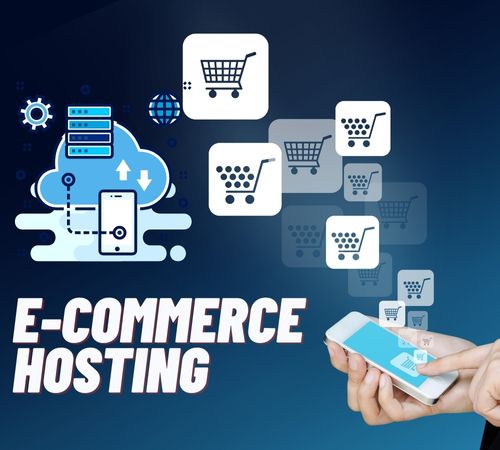If your e-commerce platform or website builder does not include a hosting service as part of its plan, you will need to select a reliable e-commerce web host. There are many options available, so we did the research to help you find the best solution.
Table of Contents
What is the best hosting for e-commerce?

Whether you are starting a new e-commerce business or expanding an existing one, choosing the right hosting provider is essential. Based on your needs and budget, you can pick any of the e-commerce hosting providers. Make sure to compare features, pricing, and performance before making your decision. With the right e-commerce host, you can easily manage your store with ease and ensure that it performs optimally.
Let’s begin with the Types of Hosting :
There are three main types of ecommerce hosting:
Shared hosting
This is the most affordable option, where your website shares server space with other websites. It’s a good choice for small businesses with low traffic levels.
Dedicated hosting
With dedicated hosting, you have your own server, which gives you more control and resources. This is a good option for businesses with high traffic levels or those that require more security.
Cloud hosting
Cloud hosting uses a network of servers to host your website, providing scalability and reliability. This is a good option for businesses that experience traffic spikes or plan to grow rapidly.
Other hostings are as below
VPS Hosting
Managed WordPress Hosting
Colocation Services
Reseller Hosting
Check out our full guide about types of e-commerce.
Factors to Consider When Choosing an Ecommerce Hosting Provider
When choosing an ecommerce hosting provider, there are a number of factors to consider, such as:
- Uptime: This is the percentage of time your website is available to visitors. Choose a provider with a high uptime guarantee, such as 99.9% or higher.
- Security: Your ecommerce store will likely store sensitive customer data, so it’s important to choose a provider with robust security features.
- Scalability: As your business grows, you’ll need a hosting provider that can accommodate your increasing traffic and storage needs.
- Customer support: Choose a provider with responsive and knowledgeable customer support in case you need help with your hosting.
- Price: Ecommerce hosting plans can range in price from a few dollars per month to hundreds or even thousands of dollars per month. Choose a plan that fits your budget and needs.
Is shared hosting good for e-commerce?
When it comes to e-commerce hosting, dedicated hosting is the most reliable and secure option. With a dedicated server, you get exclusive access to a single server for your website and all its resources. This allows for maximum performance, uptime, and security. Dedicated servers also provide customizable options that allow you to tailor the setup to your specific needs. However, due to the cost associated with this type of hosting service, it may not be the best option for smaller businesses or those just
Can I host my own e-commerce website?
Yes, it is possible to host your own e-commerce website from your home. However, this option may not be suitable for most businesses due to the inherent risks and technical expertise that is required. If you have the necessary skills and knowledge, you can set up a server on your computer and install an e-commerce platform such as WooCommerce or Magento. Hosting your own e-commerce site will require you to maintain the servers and handle any technical issues that arise. Additionally, you will need to secure your site with an SSL certificate and ensure it is PCI-compliant. For most businesses, the best option is to use a reliable hosting provider that specializes in e-commerce hosting.
Which e-commerce platform works best for dropshipping?

When it comes to dropshipping, the e-commerce platform you choose will depend on your specific needs. There are a few popular choices available that offer features and tools for drop shippers. Shopify is one of the most popular and widely used e-commerce platforms for dropshipping businesses. It offers an intuitive interface and plenty of features such as product management, payment processing, shipping integrations, and more. Additionally, it integrates with many popular marketplaces like eBay and Amazon. WooCommerce is another popular option that is free to use and has various plugins available to help streamline the dropshipping process. BigCommerce also provides features specifically designed for drop shippers such as inventory management, automated order fulfilment, tax calculation tools,
What should a beginner look for in an e-commerce hosting platform?
When it comes to choosing an e-commerce hosting platform for a beginner, there are several key factors to consider. First and foremost, you should look for a reliable provider with a good uptime guarantee, fast loading speeds, and unlimited bandwidth. The platform should also offer daily or weekly backups in case of any data loss or website crashes. Additionally, it should provide support for the most popular payment gateways and shopping carts such as PayPal and Stripe. Security is also an important factor to consider – make sure the platform provides secure encryption protocols and automated malware scanning. Lastly, if you are new to e-commerce hosting, look for providers that offer hosting packages that include technical support so you can get help when needed. A2 Hosting , for example, offers an e-commerce hosting plan that includes 24/7 technical support.
When it comes to e-commerce hosting, there are several different types of hosting options available. It can be confusing for a beginner to choose the right type of hosting for their store, so it’s important to consider your individual needs and budget before making a decision. For most small to medium-sized businesses, shared hosting with an e-commerce hosting provider is the best option. Shared hosting offers unmetered bandwidth and storage as well as various security measures at an affordable price point. If you have large amounts of traffic or need more control over your website, then dedicated or cloud hosting may be the better choice. Dedicated servers provide
What is the difference between an e-commerce platform and e-commerce hosting?

An e-commerce platform is a software solution that allows businesses to create and manage an online store, while e-Commerce hosting is the physical server or service that stores the website files and databases. The e-commerce platform includes the shopping cart, content management system (CMS), payment gateway integration, and other features needed to run an online business. The hosting provider is responsible for ensuring that the website files are stored securely and can be accessed quickly by customers. When choosing an e-commerce hosting provider, it’s important to look for one with good uptime rates, fast loading times, unlimited bandwidth, daily backups, automated malware scanning and other security measures. Additionally, you should ensure that the provider offers support for popular payment gateways and shopping carts such as PayPal and Stripe.
Dedicated hosting is the best choice for larger e-commerce businesses that receive a lot of traffic or need to handle traffic spikes. Dedicated servers provide more control over the server environment, so you can customize it to your needs. However, dedicated hosting requires a higher level of technical knowledge, so it’s not recommended for those without technical expertise. Cloud hosting is another option that offers scalability and flexibility – if your website experiences large amounts of traffic or sudden spikes in traffic, cloud hosting can help manage the load time and performance of your site. Ultimately, when choosing an e-commerce hosting platform for your business, it’s important to consider your individual needs and budget before making a decision. A2 Hosting is a popular choice for e-commerce websites, offering quality hosting packages with unmetered bandwidth, weekly backups, fast loading speeds, and an uptime guarantee. They also offer additional features such as free SSL certificates and support for popular payment gateways and shopping carts. With the right hosting provider, you can have peace of mind knowing that your online store is safe and secure.
9 Best E-commerce Hosting Providers in 2024
Looking for the best ecommerce hosting? Here’s a list of 9 providers that offer all the features you need to create and manage your online store.
- Shopify: Shopify is a comprehensive ecommerce platform, offering hosting and a range of features such as payment processing, inventory management, website design, and marketing tools. It’s suitable for businesses of all sizes, and provides an intuitive interface with lots of customization options to suit your individual needs.
- A2 Hosting: A2 Hosting offers reliable shared hosting plans that are designed specifically for ecommerce websites, with fast loading times and unmetered bandwidth included in their plans. Additionally, they offer automated backups and malware scanning for added security.
- HostGator: HostGator offers shared hosting plans with unlimited storage and bandwidth, plus additional features such as free SSL certificates and automatic daily backups. They also offer one-click installation of popular ecommerce platforms such as Magento and WooCommerce.
- Bluehost: Bluehost is a great choice for ecommerce businesses of all sizes, offering both shared and dedicated hosting plans with unlimited storage, bandwidth, and email accounts included in their packages. Additionally, they provide free SSL certificates to ensure your website is secure.
- DreamHost: DreamHost provides a range of hosting solutions for ecommerce websites, with unlimited storage and bandwidth, plus free SSL certificates and daily backups included in their plans.
- Hostinger: Hostinger is a great choice for those looking for an affordable e-commerce hosting solution. Their shared hosting plans include unlimited storage and bandwidth, plus automated daily backups and malware scanning to ensure your website is secure. Additionally, they offer support for popular payment gateways such as PayPal and Stripe.
- InMotion Hosting: InMotion Hosting offers reliable dedicated hosting solutions for ecommerce websites, with unlimited storage, bandwidth, and email accounts included in their packages. Additionally, they offer a 99.99% uptime guarantee and 24/7 customer support.
- GoDaddy: GoDaddy is one of the most popular hosting providers in the world and they offer a range of hosting solutions suitable for ecommerce websites – from shared hosting to dedicated servers. They also offer domain registration, website building tools, and a range of payment gateways.
- SiteGround: SiteGround is another popular choice for ecommerce websites, offering shared hosting plans with unlimited storage and bandwidth as well as free SSL certificates, automatic daily backups, and 24/7 customer support. They also have an optimized WordPress hosting plan that’s designed specifically for ecommerce sites.
Conclusion
The best type of hosting for an ecommerce website depends on the size of your business and the complexity of your needs. Smaller businesses may be best served by shared hosting plans such as those offered by Hostinger, A2 Hosting, Bluehost and DreamHost. Larger businesses may benefit from dedicated servers or cloud hosting options like those provided by GoDaddy, SiteGround and InMotion Hosting. Ultimately, the best hosting plan for your ecommerce website is one that offers the features you need at a price that fits within your budget.





